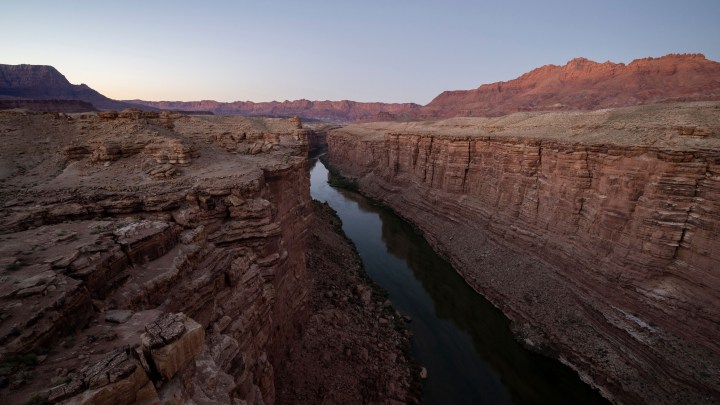
Why is it so hard to negotiate a Colorado River conservation deal?
Why is it so hard to negotiate a Colorado River conservation deal?

Almost two months ago, the seven Colorado River basin states blew past a federal deadline to negotiate significant cuts to their water usage.
There’s finally some concrete action. Water managers in California, which uses more Colorado River water than any other state, have agreed to reduce their usage by one-tenth in 2023. That is, if other stakeholders agree to cuts and the federal government sweetens the deal with some conservation funding.
Without significant conservation, all the stakeholders risk water and hydroelectric power shortage. So why is negotiating this deal so hard?
It’s one thing for two entrenched parties to reach an agreement. But along the Colorado River, seven states that have fought about this stuff for decades have to strike a major conservation deal.
“When you have multiparty negotiations, they’re really, really difficult,” said Mori Taheripour, an expert on dispute resolution at the University of Pennsylvania’s Wharton School. “People dig in their heels, and the self-advocacy prompts you to move further away from collective problem-solving.”
So it matters that California’s water districts made the first move. But that’s only the first step toward a deal.
And Daniel Shapiro, author of the book “Negotiating the Nonnegotiable,” sees some major obstacles. “Generally the process design seems perilous.”
We can’t know exactly what goes on in these closed-door talks between dozens of water managers. But we know there’s ego involved, there’s identity politics and old resentments between farming communities and cities, upper- and lower-basin states. There’s lots of money at stake.
“People are holding fast to their own positions. They’re conceding — if at all — very stubbornly, and they’re all threatening to walk to court,” Shapiro said.
Shapiro thinks the basin states could use a mediator. And maybe some group therapy to help them focus on the common threats they all face: looming water and hydroelectricity shortages that would affect millions of people.
Kyle Roerink has kept a close eye on these talks for the nonprofit Great Basin Water Network.
“If there are any FBI or CIA hostage negotiators out there who are willing to help get water managers in touch with reality, we could certainly use their help,” he said.
Roerink said these are crisis negotiations. But you wouldn’t know by watching.
There’s a lot happening in the world. Through it all, Marketplace is here for you.
You rely on Marketplace to break down the world’s events and tell you how it affects you in a fact-based, approachable way. We rely on your financial support to keep making that possible.
Your donation today powers the independent journalism that you rely on. For just $5/month, you can help sustain Marketplace so we can keep reporting on the things that matter to you.

















